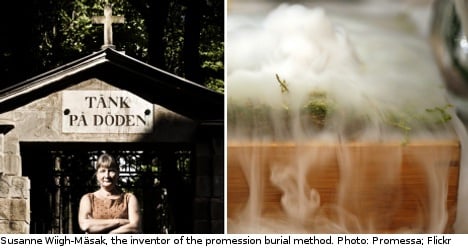The bodies have been kept in storage while a Swedish biologist, who once got an award from the king but has since been dubbed a fraud, developed her method of “freeze drying’ corpses.
That method has not yet been completed and the frozen bodies will probably not be stored much longer in wait for the technology, if the Swedish Tax Agency has its way. The agency ensures compliance with the Swedish burial law stipulating that a body should be buried within a month of death.
The agency initially granted a delay in accordance with the deceaseds’ wishes to be buried according to the controversial burial method called “promession”, but this exception ran out in 2007.
The agency is now concerned that the bodies, which are stored in Trons chapel in Vänersborg in western Sweden, pose as risk to public health and has demanded their burial.
The agency has sent a formal letter to Orust and Tanum municipality and the matter will now be considered by the municipal executive board.
The two corpses, which have been stored for 11 and 12 years respectively, are among nine currently stored in crematoriums across Sweden awaiting “promession”.
“Promession” was invented by Swedish biologist Susanne Wiigh-Mäsak in 1997 and is a method in which human remains are disposed of by freeze-drying.
The process begins with the body being frozen in liquid nitrogen to make it brittle and then shattered by vibration. Water is then removed by vacuum and any metals are then removed with a sieve.
The residual dry powder is then placed in a biodegradable casket and buried in top soil where bacteria ensure that the remains are transformed into compost within 12 months.
While Wiigh-Mäsak has received a business innovation award from Sweden’s King, the process is yet to be tested on human remains and experts have questioned its viability.
Bengt R. Johansson, a professor in cellular biology at Gothenburg University, has called the method a fraud, arguing that the body requires significantly more pressure to be broken into pieces.
The Church of Sweden and burial firm Fonus have furthermore ended their cooperation with Wiigh-Mäsak’s firm Promessa Organic.
Wiigh-Mäsak has meanwhile complained that she is being vilified by the industry and insists that the method is viable for human bodies.
Peter Vinthagen Simpson


 Please whitelist us to continue reading.
Please whitelist us to continue reading.
Member comments